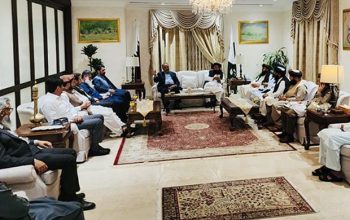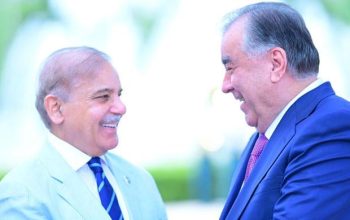Prime Minister Shahbaz Sharif has declared his intention to send a formal recommendation to President Arif Alvi for the dissolution of the National Assembly following the completion of the government's term on Wednesday (tomorrow).
He said this while addressing a ceremony centred around solar tube wells held at the Islamabad Convention Center on Tuesday.
#Live : PM @CMShehbaz attends a ceremony in Islamabadhttps://t.co/GkxdtF2I6v
— Radio Pakistan (@RadioPakistan) August 8, 2023
“Tomorrow I will recommend the president to dissolve the government and the assembly, after which the affairs will be in the hands of the caretaker government,” he remarked. “However, I am optimistic that the solar energy project will persist, ensuring that Pakistan and its people have access to cost-effective electricity in the years to come,” he added.
The Pakistan Democratic Movement (PDM) coalition government led by the Pakistan Muslim League-Nawaz (PML-N) had earlier announced that the assemblies will be dissolved on August 9 (tomorrow).
Based on Article 224(2) of the Constitution of Pakistan, elections should be held within 90 days of the dissolution of an Assembly – whether National or Provincial – and the results should be declared in a maximum of 14 days after the conclusion of polls.
Speaking at the event, the prime minister outlined his vision for a transition to cleaner and more affordable energy sources for citizens.
Also read: Polls unlikely to be held within 90 days of NA dissolution: ministers
Highlighting the significance of the solar energy project, Shehbaz Sharif noted that the initiative was launched ahead of the government's term conclusion. With the country enjoying abundant sunshine throughout the year, the government has been actively working to transition various sectors to solar energy in order to provide affordable electricity to the masses.
Electricity, the prime minister emphasised, is an essential need for all citizens and socioeconomic classes. "The provision of affordable electricity is not only a necessity but also a responsibility. The primary duty of any incoming government is to ensure the availability of cost-effective electricity," he stated.
PM Shehbaz acknowledged the challenges faced in implementing the solar energy programme due to the constraints imposed by the International Monetary Fund (IMF) programme and its associated difficulties.
Reflecting on the impact of the IMF programme, Shehbaz Sharif noted that without it, Pakistan could have faced grave consequences including shortages of essential medicines and life-saving supplies, long queues at petrol stations, and a significant decline in foreign exchange reserves. He credited the IMF programme for averting a potential crisis and preventing default.
While acknowledging the rigorous terms of the IMF agreement, the prime minister stressed the importance of future economic goals. He emphasised the need to expedite agricultural development and invest in projects aimed at generating affordable energy.
PM Shehbaz pointed out that while the IMF has provided energy subsidies, certain limitations have hindered the government's ability to deliver cheap electricity to the public.
Concluding his remarks, Prime Minister Shehbaz expressed his desire for a future free from excessive debt. He highlighted the importance of embracing strategies that prioritise poverty alleviation and sustainable economic growth.
Read the full story at the express tribune website.


